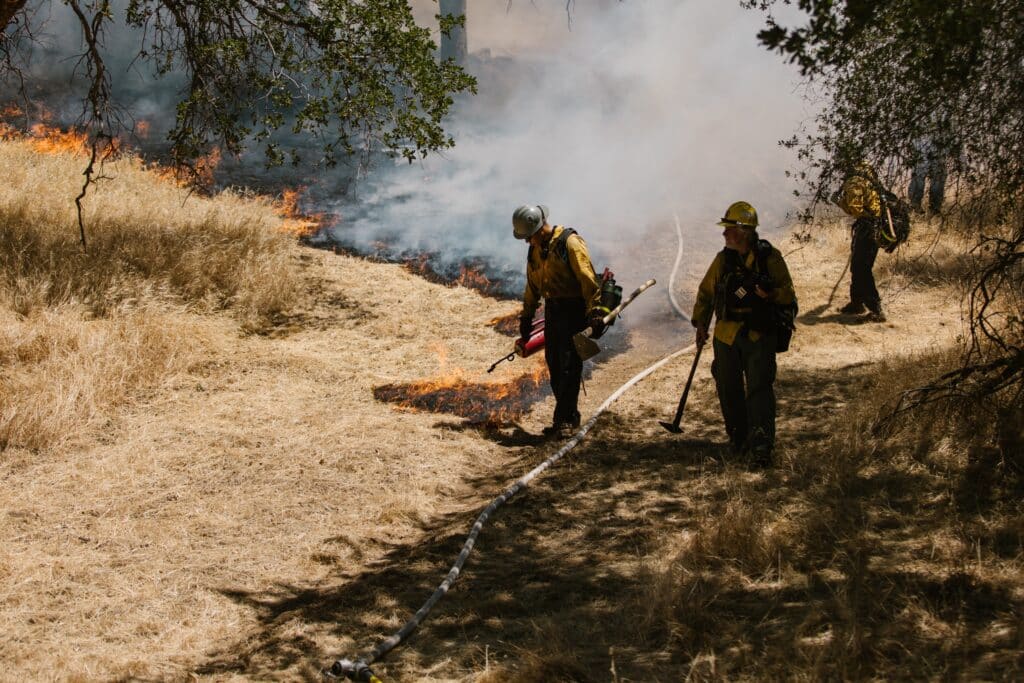Workers’ Rights During Heavy Wildfire Smoke in New Jersey
Wildfire smoke, notorious for its damaging health effects, poses significant risks to workers, especially those involved in outdoor activities. From the construction industry to farming, numerous occupations in various parts of the country confront this hazard, not least in New Jersey.
Workplace safety becomes even more paramount during periods of heavy wildfire smoke. While such situations may seem rare, climate change and urban expansion into fire-prone areas are becoming increasingly common. Understanding your rights as a worker during such events is vital to ensuring your safety and protecting your health.
This blog post will detail the regulatory framework surrounding workers’ rights during heavy wildfire smoke, explain how they apply to indoor and outdoor workers, and provide advice on navigating potentially unsafe working conditions. We’ll also delve into protections against employer retaliation, aiming to empower New Jersey workers with the knowledge they need during heavy wildfire smoke periods.
The Pivotal Role of OSHA in Ensuring Workplace Safety
Safety in the workplace is paramount in any profession. Whether in construction, manufacturing, or sitting at a desk in an office, the importance of maintaining a safe and healthy workplace can never be overstated. Spearheading this initiative in the United States is the Occupational Safety and Health Administration (OSHA), an organization firmly rooted in ensuring worker safety and health.

OSHA, a household name in workplace safety, has been dutifully committed to setting and enforcing standards that guide businesses toward cultivating safe and healthful work environments. While its scope is broad and encompasses many diverse areas, today, we’ll delve into one aspect that may not come to mind immediately – how OSHA’s regulations extend to situations involving wildfire smoke.
Interpreting OSHA’s Guidelines in the Context of Wildfire Smoke
Although OSHA does not have specific regulations dedicated to handling situations involving wildfire smoke, it provides a comprehensive and well-defined framework of general rules concerning workplace safety. Within these guidelines, employers can find applicable directives pertaining to a myriad of scenarios, including wildfire smoke exposure.
At the core of these guidelines is the General Duty Clause of the OSH Act of 1970. This clause is a potent provision mandating that employers are obligated to provide workplaces “free from recognized hazards that are causing or likely to cause death or serious physical harm” to their employees. It’s a broad directive that plays a crucial role in ensuring safety across diverse workplace situations.
In light of wildfire smoke, the General Duty Clause implies that employers must proactively engage in risk assessment, establish and implement protective measures, and ensure employees are not subjected to conditions that could detrimentally affect their health. Employers must consider factors like air quality and visibility, especially when heavy wildfire smoke infiltrates indoor and outdoor workplaces.
Protections for Outdoor Workers During Wildfire Smoke
OSHA outlines key strategies that employers should implement to mitigate smoke exposure risks. One critical tactic is adapting work schedules to circumvent periods of the day when smoke levels are exceptionally high. Another involves curbing strenuous physical activity, which can provoke heavy breathing, thus amplifying the intake of harmful smoke particles.
Regular respites in areas with cleaner air are also an OSHA recommendation for workers. These breathers provide employees with a much-needed respite from the heavy, smoke-filled air, reducing the potential for respiratory distress.

Ensuring workers have access to appropriate personal protective equipment is another employer responsibility. Tools such as N95 respirators are particularly crucial. These devices can filter out harmful smoke particles, the first defense against possible respiratory complications.
Being well-versed in these protective measures is essential for any outdoor worker in New Jersey, especially during peak wildfire seasons. If you suspect these safety precautions are not being adequately enforced, knowing how to engage with your employer or escalate the issue to OSHA can make all the difference.
Safeguards for Indoor Workers During Heavy Smoke
The misconception that indoor workers are immune to the effects of wildfire smoke can be dangerous. Buildings with deficient ventilation systems or malfunctioning HVACs can rapidly become a hub for smoke and particulates, posing a risk to those within.
To ensure the safety of indoor employees, OSHA provides guidelines on maintaining indoor air quality, and New Jersey even has dedicated indoor air quality standards. These include conducting regular maintenance checks on HVAC systems to ensure they’re in good working order and replacing air filters frequently.
Alternative solutions such as assigning different work tasks, promoting remote work, or even temporary relocation are strategies employers can leverage to shield indoor workers from smoke hazards. Additionally, respirators and indoor air filtration systems might be required, mainly if smoke infiltrates the building.
Just like their outdoor counterparts, indoor workers in New Jersey need to be aware of their rights and the safety measures that should be in place during periods of heavy wildfire smoke. Knowing the steps to address the issue is crucial in situations where these protective measures are deficient.
How to Address Unsafe Working Conditions Due to Wildfire Smoke
Suppose you perceive that your working conditions are not safe or healthy. In that case, the first line of defense is to communicate these concerns to your employer. However, if they fail to take appropriate action, you can elevate your concerns by filing a complaint with OSHA.
To ensure that OSHA can effectively assess your complaint, it’s crucial to have detailed information about the potential hazards. This includes documenting when and where you were exposed to potentially harmful conditions, such as wildfire smoke. Note any protective measures that were or were not in place, and record any health effects you experienced as a result of the exposure. This information is invaluable during OSHA’s investigation process.
It’s also worth noting that workers have the legal right to refuse work in hazardous conditions. However, this right is conditional, and understanding when and how to exercise it can be crucial to preserving your health and job security.
Understanding Employer Retaliation and Your Rights
OSHA rules explicitly state that it’s illegal for employers to retaliate against a worker for reporting unsafe conditions or refusing to work in a dangerous environment. Retaliation can manifest in various forms, such as termination, demotion, reduced hours, or harassment.
Should you suspect retaliation from your employer, filing a complaint with OSHA is crucial. Please note that OSHA requires that retaliation complaints be filed within 30 days of the alleged retaliation.
In such scenarios, seeking legal advice can be advantageous. An experienced employment attorney can help you understand your rights, gather the necessary evidence, and guide you through fighting retaliation.
Navigating Workplace Safety During Wildfire Smoke in New Jersey
Workers’ rights during periods of heavy wildfire smoke in New Jersey are multifaceted. They range from understanding OSHA regulations and protections for outdoor and indoor workers to addressing unsafe working conditions and dealing with potential retaliation.
Understanding these rights is your first defense against hazards like wildfire smoke. Should these rights be violated, knowing how to take appropriate action is of paramount importance. Your safety should never be compromised, especially during challenging periods such as wildfire seasons. Stay safe and informed; remember, you have a right to a safe working environment.

File for Workers’ Compensation Benefits With Kotlar, Hernandez & Cohen – New Jersey Workers’ Compensation Lawyers
If you or a loved one have had exposure to an environmental condition at work which you believe has caused you a significant medical condition, you may be entitled to workers’ compensation benefits. The Workers’ Compensation Act in New Jersey covers traumatic accidents and occupational exposure to toxins, which may include environmental contamination like the toxic smoke environment discussed in this article.
If you’ve been denied benefits or need additional medical treatment from a work-related exposure, we strongly encourage you to reach out to a well-qualified workers’ compensation attorney promptly, as there are strict time limitations to filing any type of workers compensation claims for benefits. Our well-qualified workers’ compensation experts stand ready to help you with your claim for any work-related injury, including smoke inhalation.
Get a free consultation here.


